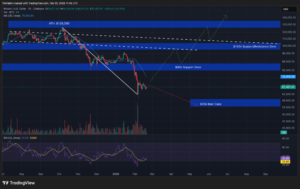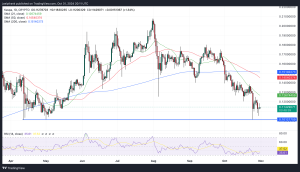Last updated:
 Why Trust Cryptonews
Why Trust Cryptonews

Crypto.com announced on October 31 that it was expanding its U.S. trading services through the acquisition of Watchdog Capital, LLC, an SEC-registered broker-dealer and member of FINRA and SIPC.
This acquisition clears the way for the platform to offer equity trading, options, and other traditional financial services to eligible U.S. traders, blending digital and traditional financial tools under one roof.
The acquisition will position Crypto.com’s U.S. subsidiary to offer securities products under a regulated framework, marking a big step beyond its traditional cryptocurrency offerings.
Watchdog Capital, a member of FINRA and SIPC, was founded by digital assets advocate Bruce Fenton.
Kris Marszalek, CEO of Crypto.com, highlighted its dedication to integrating regulated, traditional finance options with its digital-first ecosystem.
“We are aggressively working towards integrating traditional financial tools with digital financial capabilities and are doing so while maintaining our focus on building responsibly with the necessary licenses and registrations to operate as the industry’s leader,” Marszalek explained. “We are extremely confident in the future of the U.S. market as we see growing bipartisan support for our industry,”
Broker-dealer customers will soon receive more details on the available products, including eligibility and trading dates.
The expansion aligns Crypto.com with industry trends. Companies like Robinhood have similarly acquired crypto-focused platforms like Bitstamp to broaden their market presence in the European Union.
Crypto.com’s integration of traditional financial assets into its digital offerings reflects an industry-wide push to create multifaceted consumer trading environments.
This move follows Crypto.com’s recent legal action against the SEC, which followed a Wells notice issued to the company.
On October 8, Marszalek announced the lawsuit, stating that the SEC had “unilaterally expanded its jurisdiction beyond statutory limits.”
Founded in Singapore, Crypto.com launched its U.S. services in March 2022. Initially, it caters to institutional investors, but due to low demand, it paused some services in June 2023.
Despite these shifts, the exchange has remained operational for many users in the U.S. and claims over 100 million users globally.
Crypto.com has also expanded its fiat services through a partnership with Standard Chartered Bank. Now, users in more than 90 countries can deposit and withdraw fiat currencies, including the U.S. dollar and the euro.
Crypto.com, headquartered in Singapore, first entered the U.S. market in March 2022, initially targeting institutional investors. Despite suspending some services in the U.S. in June 2023, the platform has since regained momentum, now claiming over 100 million users worldwide.
Crypto.com recently partnered with Standard Chartered Bank, enabling users in 90 countries to deposit and withdraw fiat currencies—including U.S. dollars, euros, and UAE dirhams—through the Crypto.com app.
The acquisition adds to Crypto.com’s recent achievements, including launching UpDown Options, the first CFTC-regulated crypto derivatives product, and introducing PayPal as a payment method.

















